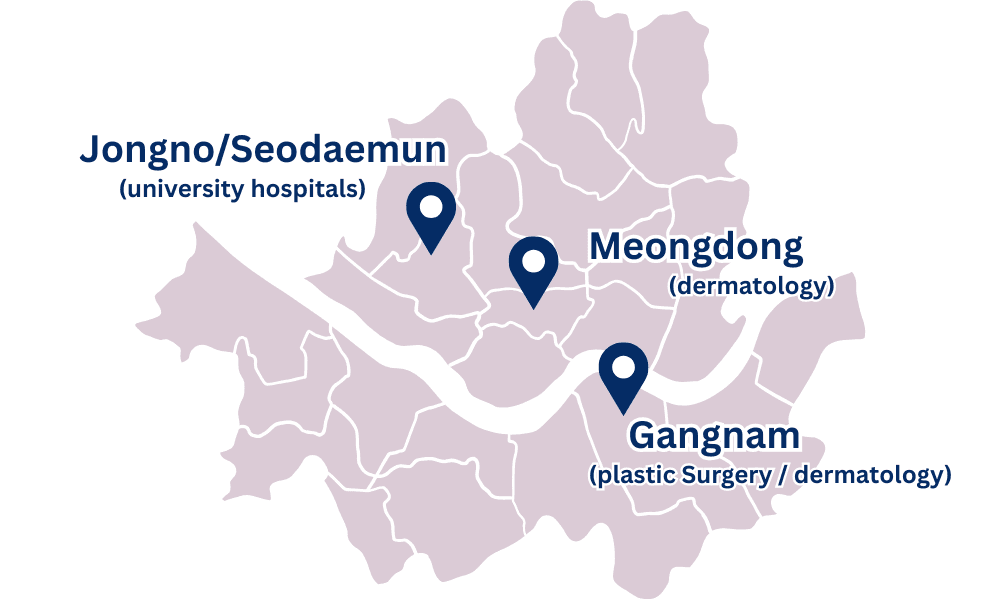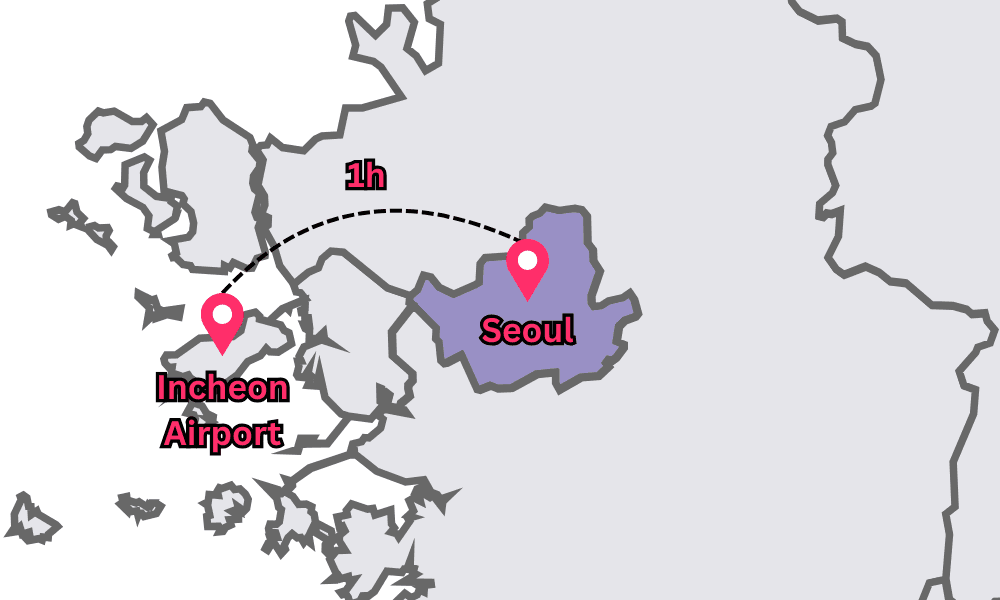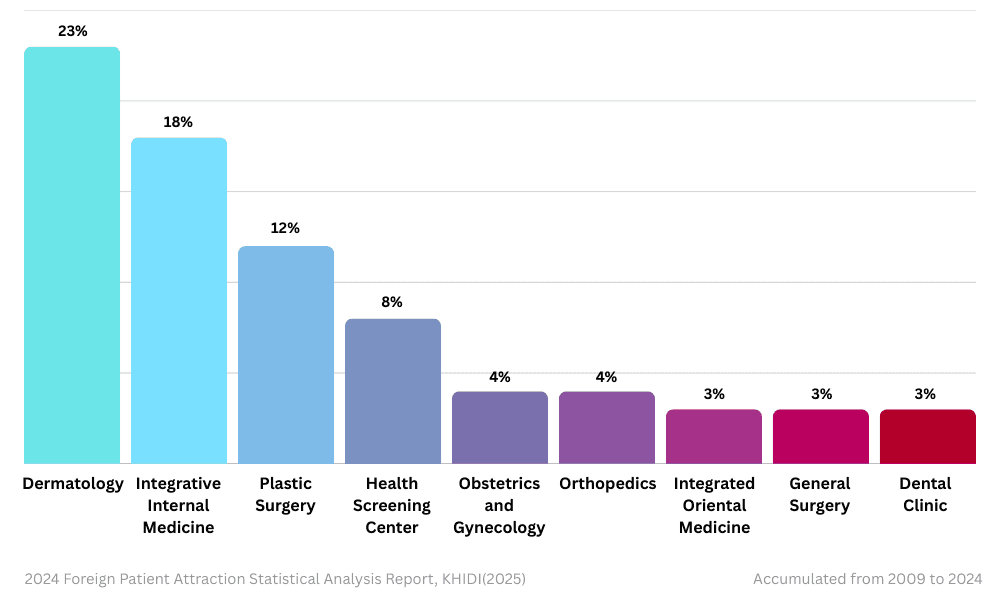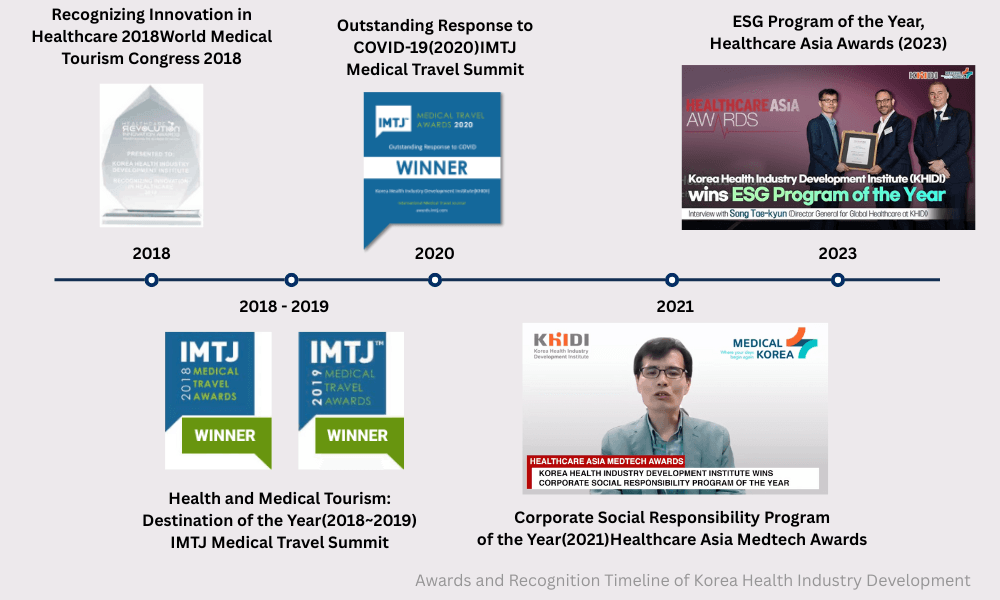Medical Tourism Blog
Medical Tourism in Korea 2025: Why Patients Choose Seoul (2025 Guide)

Table of contents
- Why Korea for Medical Tourism?
- Key takeaways at a glance
- 1) Clinical excellence—recognized globally
- 2) Speed and coordination
- 3) Why so many base in Seoul
- 4) A hub built for international patients
- 5) Transparent ways to check safety & quality
- 6) Procedures people travel for
- 7) Practical value: quality + time saved
- 8) Balanced view: what to know in 2024–2025
- 9) Global Recognition & Awards
- How to plan your trip (quick checklist)
- Plan your Seoul stay
- Frequently asked questions
- Keep exploring
Considering treatment in Korea? Everything you need to know e.g. — how to avoid scams, visas, interpreters, recovery tips — in our Medical Tourism Master Guide. Plan with confidence in minutes, not weeks!
Why Korea for Medical Tourism?
Korea combines world-class medicine with speed, coordination, and traveler-friendly access—and the benefits concentrate in Seoul. Global rankings such as Newsweek/Statista’s World’s Best Hospitals consistently feature top Korean institutions (with multiple Seoul flagships at the top), while international benchmarks place Korea near the very top worldwide for medical skill, speed, modern equipment, and responsiveness.
As for demand, Korea passed a major milestone in 2024: 1.17 million foreign patients from 202 countries, with a cumulative 5.05 million since 2009. Seoul remains the focal point—already attracting ~60% of foreign patients in 2022—thanks to its dense network of high-ranked hospitals, multilingual support, and direct connectivity via Incheon International Airport.
Key takeaways at a glance
- Top-ranked hospitals: Seoul concentrates many of Korea’s highest-ranked hospitals on World’s Best Hospitals, signaling clinical depth across cancer, cardiac, transplant, and reconstructive care.
- Elite performance on global indices: Korea consistently places near the top of Numbeo’s Health Care Index (Top 2 in 2022/23; Top 2 mid-2025).
- Record international demand: 1.17M foreign patients in 2024; momentum continues post-pandemic.
- Travel-friendly infrastructure: Multilingual Medical Korea Information Centers in downtown Seoul and at Incheon Airport help patients navigate care, refunds, and logistics.
- Safety & quality labels you can check: Government registry (KHIDI/Medical Korea) and the KAHF accreditation for hospitals serving foreign patients.
New to this? Start with our A–Z Planner to choose a clinic, verify credentials, compare costs, and plan recovery.
1) Clinical excellence—recognized globally
Korea’s tertiary centers lead in complex oncology, cardiovascular, transplant, robotic, and reconstructive procedures. That performance shows up in international hospital rankings, where Seoul facilities (e.g., Asan, Samsung, Severance, SNUH) routinely place among the best. This concentration of expertise makes it easier to combine diagnostics, surgery, and aftercare on one trip.

2) Speed and coordination
International patients value fast diagnostics, short wait times, and tightly scheduled care pathways. Korea’s digital hospital systems and consolidated check-up programs help compress workups (imaging, labs, consults) into days, not weeks—one reason medical travelers pair treatment with short stays.
3) Why so many base in Seoul
Beyond hosting most high-ranked centers, Seoul offers the densest cluster of clinics, sub-specialists, imaging, and aftercare—plus easy transfers from ICN. In 2022, ~60% of all foreign patients who came to Korea chose Seoul. Expect compact travel times, abundant lodging, and recovery-friendly neighborhoods.

From Incheon International Airport (ICN), it’s about 1 hour to central Seoul.
4) A hub built for international patients
Seoul runs Medical Korea Information Centers (Seoul Station & Incheon Airport) offering multilingual guidance on hospitals, appointments, interpretation, and paperwork (including VAT-refund steps where applicable). Many hospitals add in-house coordinators and interpreters (EN/CH/JP and more).
5) Transparent ways to check safety & quality
Two public checks will save you time and risk:
- Clinic registration: Use Medical Korea (KHIDI) to confirm the provider is legally registered to treat foreign patients. Only registered institutions are authorized.
- Hospital-level accreditation for foreigners: Look for the KAHF mark (Korean Accreditation Program for Hospitals Serving Foreign Patients), focused on service quality and patient safety for international care.
Checklist: What to verify before you book
6) Procedures people travel for
Patient mix spans dermatology & aesthetics, health screening (check-ups), dental, and orthopedics, alongside referrals for oncology and cardiac care at major centers. Post-pandemic recovery has seen a sharp rebound and a record-setting 2024.

Top specialties among foreign patients
7) Practical value: quality + time saved
Official materials highlight Korea’s proposition of high quality care with efficient access. When you factor in compressed timelines (less time off work), bundled diagnostics, and coordinator support, the overall trip can compare favorably with many alternatives—especially for procedures where timing and technology drive outcomes.
What you get in a 7–10 day Seoul care plan” (workup, surgery, initial follow-ups).
8) Balanced view: what to know in 2024–2025
Like any advanced health system, Korea periodically adjusts policies (workforce, reimbursement, focus on severe disease) and experiences capacity swings. Planning ahead (bookings, documentation, and clear aftercare plans) keeps your trip smooth—even during system changes.
9) Global Recognition & Awards
Korea’s reputation as an advanced medical destination is reinforced by multiple international honors recognizing quality, innovation, and system-level responsiveness.
- Health & Medical Tourism: Destination of the Year (2018–2019) — IMTJ Medical Travel Summit
- Outstanding Response to COVID-19 (2020) — IMTJ Medical Travel Summit
- Recognizing Innovation in Healthcare (2018) — World Medical Tourism Congress
- Porter Prize for Excellence in CSV (2019)
- Corporate Social Responsibility Program of the Year (2021) — Healthcare Asia Medtech Awards
- ESG Program of the Year (2023) — Healthcare Asia Awards

Awards and Recognition Timeline of Korea Health Industry Development
How to plan your trip (quick checklist)
- Verify the provider in the KHIDI registry; prefer KAHF-accredited hospitals when relevant.
- Choose the surgeon, not the brand: confirm board certification and matched case experience.
- Get a written, itemized estimate (surgery, anesthesia, facility, tests, aftercare).
- Ask about coordination: interpreters, airport pickup, remote follow-ups.
- Line up aftercare at home and obtain English medical records before departure.
See our complete 2025 Medical Tourism Guide to Korea
Plan your Seoul stay
- Where to stay: pick walkable areas to your clinic/hospital with easy subway access.
- Recovery-friendly activities: gentle walks, cafes, cultural sites, spas/temple-stays to support relaxation.
- Getting help on arrival: coordinate airport pickup, interpretation, and appointment logistics through your licensed medical travel agency or your clinic’s international desk. They can confirm routes from ICN, share contact numbers, and help with any paperwork.
Frequently asked questions
Is English support available?
Yes—many hospitals and clinics have international coordinators. You can also book a professional interpreter via your medical travel agency or request one directly from your clinic’s international desk.
How do I check if a hospital is foreign-patient friendly?
Work through a licensed medical travel agency or contact the clinic/hospital directly. Ask for:
- Proof of surgeon board certification and matched case experience
- Availability of interpreters and a named coordinator
- A written, itemized estimate (procedure, anesthesia, facility, tests, aftercare)
- A clear aftercare plan and an emergency contact during recovery
Why base my trip in Seoul?
It concentrates top hospitals, subspecialists, diagnostics, and support services—and already attracts the majority of international patients.







